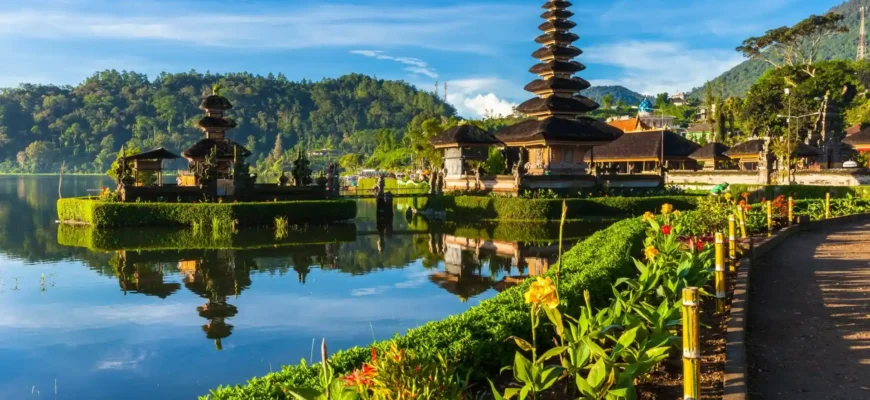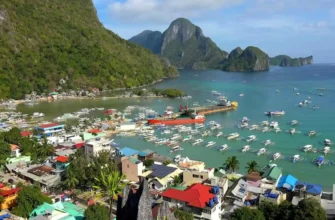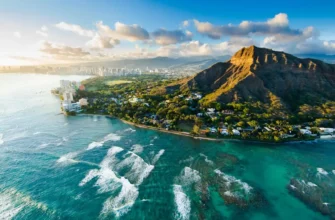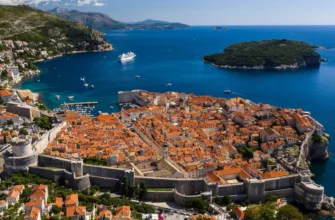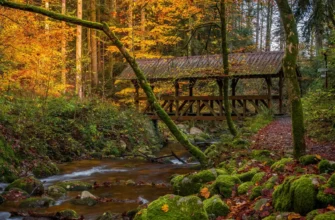1. Geographic Location
Bali, known as the “Island of the Gods,” is a small island located in the central region of Indonesia. Positioned between the islands of Java to the west and Lombok to the east, Bali is part of the Indonesian archipelago. It lies in the Indian Ocean, making it a popular destination for beach lovers and surfers alike. Bali’s landscape is diverse, ranging from the volcanic mountains of Mount Agung and Mount Batur to lush terraced rice fields and pristine beaches. The island’s natural beauty is enhanced by its tropical climate, with sunny days and warm waters year-round.
Bali’s capital city, Denpasar, is located in the southern part of the island, while other key destinations include Ubud—known for its art and culture—and Kuta, famous for its vibrant nightlife and surfing spots. Bali’s geographic diversity, from its dense jungles and flowing rivers to its world-renowned beaches, makes it a favorite among both adventurers and those seeking relaxation.
2. Historical Overview
Bali’s history is rich with cultural and religious influences, dating back thousands of years. Hinduism arrived in Bali from India during the early centuries of the first millennium, shaping the island’s religious and cultural practices that continue to thrive today. The island became a significant cultural and trading hub within the Southeast Asian region, interacting with Java, China, and other parts of the Indonesian archipelago.
In the 16th century, as Islam spread across the Indonesian islands, Bali remained a stronghold of Hinduism, which has significantly influenced its traditions, architecture, and ceremonies. The island became part of the powerful Majapahit Empire and developed a unique blend of Balinese Hindu culture. European contact began in the 16th century with Dutch colonization in the early 20th century, which impacted Bali’s political landscape.
Bali gained global attention in the 20th century as artists and explorers were drawn to the island’s beauty and culture. It later became part of Indonesia following the country’s independence in 1945. Despite being part of a Muslim-majority nation, Bali remains predominantly Hindu, which is reflected in its temples, festivals, and daily life.

3. Visual Appeal and Cultural Value
Bali’s visual appeal is legendary, attracting millions of visitors with its combination of natural beauty and cultural richness. The island is dotted with iconic landmarks that showcase its deep cultural heritage and stunning scenery.
One of Bali’s most famous landmarks is the Tanah Lot Temple, perched dramatically on a rock formation overlooking the ocean. This sea temple is a symbol of Bali’s religious and spiritual significance and offers a stunning view, especially during sunset. The Uluwatu Temple, located on the southwestern tip of Bali, also offers breathtaking views of the ocean from its clifftop setting. Both temples are vital parts of Bali’s religious practices and a must-visit for anyone exploring the island.
In the heart of Bali, Ubud is the cultural capital, home to traditional dance performances, art galleries, and the famous Sacred Monkey Forest Sanctuary. Ubud is known for its serene environment, where lush rice terraces like those in Tegallalang create postcard-perfect landscapes. Visitors can enjoy art markets, cooking classes, and wellness retreats in this area, making it a hub for spiritual and cultural exploration.
The Tirta Empul temple, with its sacred water springs, is another key cultural site. Balinese Hindus come here for purification rituals, and tourists can participate in the ceremonial bathing process. Bali’s festivals, such as Nyepi, the Balinese New Year, and Galungan, are colorful celebrations of the island’s unique Hindu traditions, filled with music, offerings, and community events.
4. Tourism Statistics (Brief Mention)
Tourism is the backbone of Bali’s economy, with over 6.3 million international visitors in 2023. The island’s beaches, temples, and cultural experiences draw tourists from around the world, with major events like the Bali Arts Festival and international surfing competitions attracting both culture enthusiasts and adventure seekers. Bali’s tourism continues to thrive, with popular destinations such as Seminyak, Nusa Dua, and Canggu maintaining high visitation rates year-round.
5. Environmental Challenges
Despite its beauty, Bali faces significant environmental challenges. The rapid growth of tourism has led to increased plastic pollution, deforestation, and pressure on the island’s waste management infrastructure. The island’s beaches, while stunning, are often affected by seasonal garbage washing up on the shores, particularly in areas like Kuta and Seminyak. Deforestation in some areas for development has also put pressure on local wildlife and ecosystems.
Bali has been proactive in addressing these concerns. The Bye Bye Plastic Bags initiative, started by local youth, has gained international attention for reducing plastic waste on the island. Bali also introduced a ban on single-use plastics in 2019, helping to decrease the amount of plastic pollution. Conservation efforts to protect coral reefs and forests are ongoing, with many eco-friendly resorts promoting sustainable tourism practices. Visitors are encouraged to support these efforts by participating in beach clean-ups, using reef-safe sunscreen, and choosing eco-conscious accommodations.
Bali is a destination that seamlessly blends natural beauty with cultural richness. Its iconic landmarks, vibrant traditions, and welcoming spirit make it one of the world’s most popular travel destinations. As Bali continues to navigate environmental challenges, it remains committed to preserving its natural and cultural heritage for future generations of travelers to enjoy.

Visitor Reviews: Bali, Indonesia – A Mix of Beauty and Practical Challenges
1. Top 3 Positive Reviews
“A Magical Experience in Ubud!” (5 Stars)
Review by Jessica L., USA
“My trip to Ubud, Bali, was nothing short of magical! The lush rice terraces in Tegallalang were like something out of a painting, and the Sacred Monkey Forest Sanctuary was a highlight. Walking through the jungle with monkeys swinging from trees around us was such a unique experience. Ubud is full of culture, from art galleries to traditional Balinese dance performances in the evenings. We even participated in a purification ritual at the Tirta Empul Temple, which was deeply spiritual. Bali is truly a place where you can relax, explore, and find yourself. I can’t wait to go back!”
“Breathtaking Sunsets at Tanah Lot” (5 Stars)
Review by Michael S., UK
“Bali was beyond what I expected! Tanah Lot Temple, with its stunning ocean backdrop, was the most beautiful place I’ve ever visited. We watched the sunset there, and it felt like time stood still. The island has an amazing blend of natural beauty and rich culture. I loved the Balinese people’s friendliness, and the way the island embraces its Hindu traditions through the temples, offerings, and ceremonies was fascinating. Bali is a dream destination for anyone who appreciates culture, spirituality, and nature. I’m already planning my next trip!”
“Uluwatu Temple and Surfing Paradise!” (5 Stars)
Review by Anna G., Australia
“Bali is my new favorite getaway! Uluwatu Temple was breathtaking, especially with the waves crashing against the cliffs below. We watched a traditional Kecak dance performance there during sunset, and it was mesmerizing. The surf in Uluwatu is also incredible—some of the best waves I’ve ever caught. Bali is great for adventurers, but it also offers peace and relaxation. The mix of stunning beaches, cultural sites, and the friendly vibe make it the perfect vacation spot. Highly recommend for both surfers and culture lovers!”
2. Top 3 Negative Reviews
“Beautiful but Crowded” (3 Stars)
Review by Daniel K., Germany
“Bali is undeniably beautiful, but it was much more crowded than I anticipated, especially in areas like Kuta and Seminyak. While the beaches are stunning, it was difficult to fully enjoy them with so many people around, especially during peak season. Even popular cultural spots like Tanah Lot and Uluwatu Temple were packed with tourists, which took away from the peaceful experience we were hoping for. If you’re visiting Bali, I recommend going during the off-season or seeking out less crowded spots to really enjoy the island’s beauty.”
“Tourist Costs Are Higher Than Expected” (3 Stars)
Review by Sophie R., Canada
“I had an amazing time in Bali, but I found some things to be a bit pricier than expected, especially in popular tourist areas like Seminyak and Canggu. Food, accommodation, and tours were a bit higher than what I had budgeted for, especially when compared to other parts of Southeast Asia. While Bali is worth the visit for its beauty and culture, travelers should be prepared for slightly inflated prices in the more tourist-heavy spots. It’s still affordable compared to Western countries, but not as budget-friendly as I expected.”
“Environmental Concerns Are Hard to Ignore” (2 Stars)
Review by James M., USA
“Bali’s natural beauty is incredible, but I was disappointed by the amount of plastic waste I saw on some of the beaches, particularly around Kuta. It was sad to see such a beautiful place struggling with pollution. I know there are local initiatives trying to reduce waste, and some hotels are doing their part by banning single-use plastics, but it’s clear the island has a long way to go in terms of environmental protection. I really hope that Bali continues to work on these issues, as the pollution does affect the overall experience.”
These reviews highlight the incredible beauty, culture, and spiritual experiences Bali offers, while also pointing out some challenges like crowds, higher costs in tourist areas, and environmental concerns. While Bali remains a top destination, travelers should plan carefully to avoid overcrowded spots and support eco-friendly initiatives to help preserve the island’s natural charm.

Key Recent and Upcoming Events in Bali, Indonesia
1. Recent Significant Events
Bali Arts Festival 2023
One of the most iconic cultural celebrations in Bali, the Bali Arts Festival, returned in June 2023 with vibrant performances, traditional dance, and an extraordinary display of Balinese culture. Held annually in Denpasar, the festival is a month-long celebration that highlights Bali’s rich artistic heritage. The 2023 edition featured a grand opening parade, showcasing the island’s distinct dances like Barong and Legong, as well as theatrical performances, gamelan music, and art exhibitions. Visitors were treated to workshops on traditional Balinese crafts, giving them the opportunity to learn about the intricate art of Balinese offerings and temple decorations. The festival also included a variety of culinary experiences that allowed guests to indulge in local flavors, making it a highlight for both locals and international visitors.
Nyepi Day 2023 (Bali’s Day of Silence)
In March 2023, Bali observed Nyepi, the Balinese New Year, with its traditional “Day of Silence.” Nyepi is a unique holiday, unlike any other in the world. The entire island comes to a standstill, with airports closed, businesses shuttered, and locals and tourists alike required to stay indoors, refraining from any activities. This day of reflection is an important spiritual tradition for Balinese Hindus, focused on meditation, fasting, and cleansing the island of negative energies. In the days leading up to Nyepi, villages hold colorful Ogoh-Ogoh parades, where large demonic effigies are carried through the streets to symbolize the purging of evil spirits. For visitors, Nyepi is an extraordinary opportunity to experience Bali’s spiritual depth, and while activities are restricted on the day itself, witnessing the Ogoh-Ogoh parade and feeling the calm that follows is a one-of-a-kind experience.
Ubud Writers & Readers Festival 2022
In October 2022, the Ubud Writers & Readers Festival celebrated its return as one of Southeast Asia’s most renowned literary events. The festival, held in the cultural hub of Ubud, brought together writers, journalists, artists, and intellectuals from around the globe for a series of workshops, discussions, and readings. The theme of the 2022 edition was “Uniting Humanity,” and it featured thought-provoking conversations about global issues, culture, and the arts. For visitors, it was an opportunity to engage with creative minds, discover Indonesian literature, and explore Ubud’s rich artistic traditions. The event also included walking tours, film screenings, and art exhibitions, making it a multidisciplinary celebration of both literature and Balinese culture.
2. Upcoming Events
Nyepi Day 2024 (March 2024)
Nyepi, Bali’s famous Day of Silence, will once again be observed in March 2024. This sacred day marks the Balinese New Year and is one of the most significant spiritual events on the island. While the day itself requires everyone on the island to stay indoors, the lead-up to Nyepi is filled with festive activities, particularly the Ogoh-Ogoh parades. These processions feature massive, hand-crafted effigies that are carried through the streets, often accompanied by music and dancing. After the parade, the effigies are burned to rid the island of evil spirits. Visitors are encouraged to plan their trips around this event, ensuring they witness the parades while also respecting the customs of Nyepi Day. For those staying in Bali during Nyepi, the enforced silence offers a rare moment of peace and reflection, providing a truly unique travel experience.
Bali Spirit Festival 2024 (April 2024)
For those interested in wellness, yoga, and spirituality, the Bali Spirit Festival is one of the most anticipated events on the island. Set to take place in April 2024 in Ubud, this multi-day festival attracts participants from all over the world. The event focuses on personal well-being, holistic health, and cultural exchange, offering workshops in yoga, meditation, dance, and traditional healing practices. Alongside wellness activities, visitors can enjoy live music performances and arts showcases, blending Balinese traditions with global influences. Whether you’re a seasoned yogi or a curious traveler, the Bali Spirit Festival is a must for those seeking balance and connection during their time in Bali.
Ubud Food Festival 2024 (June 2024)
Food lovers will want to mark their calendars for the Ubud Food Festival in June 2024. This three-day culinary event celebrates Indonesia’s rich food heritage, spotlighting Bali’s local ingredients and flavors. Chefs from around the world will converge in Ubud to share their culinary expertise, with cooking demos, food markets, and tasting sessions open to visitors. The festival also includes panel discussions on sustainable food practices, and for those wanting a hands-on experience, there are cooking classes where participants can learn to make traditional Balinese dishes. It’s the perfect event for travelers wanting to explore Bali’s food culture while supporting local farmers and artisans.
Bali Kite Festival 2024 (July 2024)
In July 2024, Bali’s skies will be filled with colorful kites as the Bali Kite Festival takes place on the beaches of Sanur. This annual event, which originated as a seasonal festival to thank the gods for bountiful harvests, has become a major cultural event. Teams from across the island compete in kite-flying competitions, showcasing traditional Balinese kites in all shapes and sizes, some reaching over 10 meters in length. The festival is accompanied by traditional music, including the gamelan, creating a festive atmosphere. Visitors can participate in kite-making workshops or simply enjoy watching the spectacular displays. The Bali Kite Festival is a family-friendly event that highlights the island’s deep connection to nature and spirituality.
From the sacred silence of Nyepi to the artistic flair of the Bali Arts Festival, Bali offers a wide range of events that highlight its rich culture and traditions. Whether you’re a wellness enthusiast, a foodie, or someone drawn to Bali’s unique spiritual atmosphere, the upcoming year promises a variety of festivals and celebrations that allow visitors to connect with the island’s vibrant culture. Make sure to plan your trip around these events to fully experience the magic of Bali!

Travel Tips for Visiting Bali, Indonesia: Your Essential Guide
1. Pre-Travel Preparation
Packing Tips
Bali’s tropical climate calls for light, breathable clothing. Pack loose-fitting fabrics like cotton or linen to stay comfortable in the heat. Bring swimwear for the beaches and pools, but also modest clothing if you plan to visit temples or participate in cultural events—sarongs and cover-ups are often required in religious sites like Tanah Lot and Uluwatu Temple.
Sunscreen is a must (opt for reef-safe to protect Bali’s marine life), as well as a hat and sunglasses for sun protection. Don’t forget insect repellent, especially if you’ll be exploring jungle areas or staying in Ubud, where mosquitoes are more common.
If you plan to go hiking (such as trekking up Mount Batur for sunrise), pack sturdy walking shoes or hiking boots. For everyday wear, sandals or flip-flops are ideal. A reusable water bottle is handy, as you’ll need to stay hydrated. Bali’s weather is generally warm year-round, but a light jacket may be useful for cooler evenings in the mountains or if you plan to visit in the rainy season (November to March).
Travel Documents
Ensure your passport is valid for at least six months beyond your intended stay. Many nationalities can enter Indonesia visa-free for up to 30 days, but check the latest regulations. Travel insurance is also highly recommended, especially if you plan on doing adventure activities like surfing, diving, or hiking.
2. What to Watch Out For
Navigating Bali
Bali’s transportation can be tricky due to heavy traffic in popular areas like Kuta, Seminyak, and Ubud. The easiest way to get around is by hiring a private driver or renting a motorbike (if you have experience riding). Apps like GoJek and Grab are also available for booking taxis or motorbike rides. Renting a car is an option, but the roads can be narrow and chaotic, so driving yourself isn’t always recommended unless you’re comfortable with Bali’s traffic.
Public transportation is limited, so if you plan to explore more remote areas like Lovina or Amed, hiring a driver for the day or booking a tour is the most convenient option. If you plan to travel between Bali’s neighboring islands, such as Nusa Penida or Gili Islands, ferry services are readily available, and booking tickets in advance is recommended during peak season.
Avoiding Tourist Traps
While Bali is a beautiful destination, it’s important to be mindful of tourist traps. Popular beaches like Kuta and Seminyak can be overcrowded, and vendors may approach you frequently, sometimes with inflated prices for souvenirs. In Ubud, avoid overpaying for taxis—always negotiate or use a ride-hailing app.
Some activities, such as elephant parks or animal performances, may appear fun, but it’s important to research the ethics of these attractions. Instead, consider visiting ethical sanctuaries like the Mason Elephant Sanctuary or choosing eco-friendly activities like cycling tours, organic farm visits, or snorkeling with responsible operators.

3. Challenges and Dangers
Crowds and Peak Seasons
Bali’s beauty draws large numbers of tourists, particularly in high season (July to September and December to January). Expect crowds in popular areas like Seminyak, Uluwatu, and Ubud. To avoid overcrowded beaches and attractions, consider visiting during the shoulder seasons (April to June and October), when the weather is still pleasant, but the tourist influx is lower.
Weather Issues
The rainy season in Bali lasts from November to March. While the rain usually comes in short bursts, it can disrupt outdoor activities like hiking or surfing. Flooding can also occur in low-lying areas. During the dry season, from April to October, Bali enjoys sunny days and low humidity, making it ideal for beach activities and exploring the island’s temples and jungles.
Local Customs
Bali’s Hindu culture is deeply rooted in everyday life, and visitors should respect local customs, particularly in religious spaces. When visiting temples, wear modest clothing and cover your shoulders and knees. Sarongs are often provided at temple entrances, but bringing your own is a good idea. Avoid touching or stepping over offerings (known as canang sari) that are placed on the ground as part of daily rituals. Also, be mindful of the Balinese concept of Tri Hita Karana, which emphasizes harmony between people, nature, and the divine.
Health and Safety
Bali is generally a safe destination, but petty theft can happen, particularly in crowded tourist areas. Always keep an eye on your belongings and avoid leaving valuables unattended on the beach. Be cautious when riding motorbikes—traffic can be unpredictable, and accidents are common. If you rent a motorbike, always wear a helmet and have proper insurance.
4. Advance Booking Advice
Accommodations
Bali has a wide range of accommodations, from luxury resorts to budget-friendly guesthouses. If you’re visiting during the high season or for major events like Nyepi or the Bali Arts Festival, it’s essential to book your stay well in advance. Popular areas like Seminyak, Canggu, and Ubud can fill up quickly, so plan accordingly. For a quieter experience, consider booking accommodations in less touristy areas like Sidemen or Lovina.
Transportation
Pre-booking transportation is key for a smooth trip, especially for airport transfers or day tours. Many hotels offer airport pick-up services, which can save you from dealing with local taxis. If you plan to take a boat to nearby islands, such as Nusa Lembongan or Nusa Penida, purchase your ferry tickets online in advance to secure your spot. For longer day trips, hiring a driver for the day is a convenient and affordable way to explore Bali’s remote areas and hidden gems.
Activities and Tours
If you’re planning to participate in popular activities like Mount Batur sunrise treks, cooking classes, or diving excursions, it’s best to book these experiences ahead of time, especially during peak tourist season. Many tour operators and adventure activities offer online booking, allowing you to secure your spot before arriving on the island. Booking in advance also ensures you get the best guides and equipment for a memorable experience.
Bali is a dream destination filled with vibrant culture, stunning landscapes, and rich traditions. By packing wisely, respecting local customs, and planning ahead for accommodations and transportation, you can enjoy a smooth and unforgettable trip to the “Island of the Gods.” Whether you’re exploring temples, surfing world-class waves, or hiking through rice terraces, Bali promises an adventure that caters to every traveler.
What to Do After Visiting Bali: Explore Nearby Day-Trip Destinations
1. What’s Next After Bali?

Bali offers a wealth of natural beauty, vibrant culture, and exciting experiences, but there’s even more to explore just beyond the island itself. After enjoying the beaches, temples, and lush landscapes of Bali, you might be wondering where to go next. Fortunately, there are several incredible destinations within a 50 km radius of Bali that make for perfect day trips, offering new adventures and a change of scenery.
Nusa Penida
Just a short boat ride from Bali’s coast, Nusa Penida is a must-visit for travelers seeking dramatic landscapes and a quieter, more off-the-beaten-path experience. The island is famous for its breathtaking cliffs, crystal-clear waters, and stunning beaches like Kelingking Beach, with its iconic dinosaur-shaped rock formation. Angel’s Billabong and Broken Beach are natural wonders that will leave you in awe, while snorkeling or diving around Crystal Bay offers the chance to see vibrant coral reefs and even Manta Rays. Nusa Penida is the ideal day trip if you’re looking to escape the busier areas of Bali and enjoy some jaw-dropping natural beauty.
Nusa Lembongan
Located next to Nusa Penida, Nusa Lembongan is another great option for a relaxing day trip. This small island is known for its laid-back vibe, stunning beaches, and excellent water activities. Whether you’re interested in paddleboarding, snorkeling, or diving, Nusa Lembongan has plenty to offer. The island’s Mushroom Bay is perfect for swimming and lounging on white sands, while Devil’s Tear offers a dramatic view of waves crashing against rocky cliffs. For a unique experience, explore the island’s mangrove forests by boat or kayak. Nusa Lembongan’s relaxed atmosphere makes it a perfect escape from Bali’s busier areas, offering a peaceful retreat with plenty of adventure.
Ubud’s Surrounding Villages
If you’re staying in Ubud, you don’t have to venture far to experience some of Bali’s hidden gems. The villages surrounding Ubud offer a glimpse into traditional Balinese life, arts, and crafts. Tegallalang, just 10 kilometers from Ubud, is famous for its stunning terraced rice fields that cascade down hillsides. Spend the day wandering through the terraces, learning about traditional rice farming, or visiting one of the village’s many art galleries and shops. Nearby, the village of Mas is known for its woodcarving, where you can watch skilled artisans at work and purchase intricate wooden sculptures as souvenirs.
Mount Batur
For the adventurers, a sunrise trek up Mount Batur, an active volcano located about 40 kilometers from Ubud, is an unforgettable experience. The hike begins in the early hours of the morning, allowing you to reach the summit just in time to witness a stunning sunrise over Bali’s landscape. The trek is moderately challenging but suitable for most fitness levels, and the reward is a panoramic view of Lake Batur and the surrounding mountains. After the hike, unwind in the nearby Toya Devasya Hot Springs, where you can soak in natural hot pools while enjoying views of the lake and volcano.
Tirta Gangga Water Palace
Located about 50 kilometers from Ubud, Tirta Gangga is a beautiful royal water palace that offers a peaceful day of exploration. The palace is famous for its stunning water gardens, filled with lily ponds, fountains, and ornate stone carvings. Visitors can wander through the serene pathways, feed the fish in the ponds, and admire the intricate Balinese architecture. Tirta Gangga is a great day trip for those interested in Bali’s cultural and royal heritage, offering a tranquil escape from the more crowded tourist spots.
2. Engage Readers
Have you visited any of these nearby destinations after exploring Bali? We’d love to hear about your experiences! Whether you hiked up Mount Batur, soaked in the beauty of Nusa Penida, or enjoyed the peaceful vibes of Nusa Lembongan, your stories and recommendations can help other travelers plan their next adventure.
Planning your next trip after Bali? There’s so much more to discover just a short distance away. Share your travel tips, favorite spots, and hidden gems in the comments below, and let’s inspire each other to explore the stunning islands and landscapes beyond Bali!


